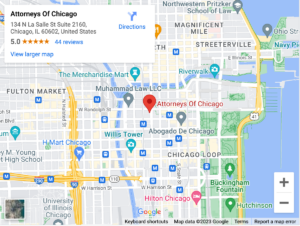
Personal injury law provides recourse for injured individuals. State law allows those harmed because of another’s negligence or wrongdoing to obtain compensation.
Personal injury attorneys play a critical role in advocating for injury victims. They can help their clients bring personal injury cases against the individuals or entities responsible for the harm.
What Is Personal Injury Law?

Personal injury law applies to harm to people or property. The law protects those injured or sustained property damage because of another’s negligence or intentional acts.
A personal injury claim is a tort action. Tort refers to a civil wrong.
In a successful personal injury case, the individual who caused the injury or harm compensates the individual who sustained the loss.
In some cases, a person dies because of another’s negligence. In these types of cases, personal injury law allows an estate representative or surviving family member to bring a wrongful death claim against the individual responsible.
Personal injury law encompasses many cases. These include vehicle accidents, medical malpractice, slip and fall incidents, workplace accidents, and product liability.
What Types of Cases Do Personal Injury Lawyers Handle?
Personal injury lawyers handle several types of cases involving personal injuries or losses.
Vehicle Accidents
Vehicle accidents constitute a primary category of personal injury cases. In addition to car accidents, vehicle personal injury cases also include trucking accidents, motorcycle accidents, bicycle accidents, and pedestrian accidents.
Slip and Fall Accidents
Personal injury lawyers also handle slip and fall cases. Slips and falls can occur anywhere, but they regularly take place in businesses. When a business or other property does not maintain its premises safely, patrons can sustain injuries. Injured patrons may bring personal injury cases against establishments responsible for their injuries.
Workplace Injuries
Workplace injuries are another type of case personal injury lawyers handle. Workers’ compensation is one possibility for receiving damages after this type of injury. However, in some cases, it may be possible to file a personal injury lawsuit for additional compensation.
Medical Negligence
Personal injury lawyers also represent victims of medical negligence or medical malpractice. Medical negligence occurs when a healthcare professional breaches their duty of care to a patient, causing harm. Obtaining compensation can involve using expert testimony to establish the standard of care.
Products Liability
In some cases, defective products harm individuals. A personal injury lawyer can represent a client in a product liability case. The individual may sue those involved in the distribution chain who played a role in the injury.
Premises Liability
People can suffer injuries because of dangerous conditions on another person’s property. A successful premises liability case entails establishing the following:
- A dangerous condition existed on someone else’s property.
- The property owner or person in control of the property was negligent.
- Because of the negligence, the victim suffered an injury.
Like many personal injury cases, premises liability involves negligence. Slip and fall accidents, discussed above, generally fall under the category of premises liability.
Dog Bites
Dog owners have a duty to keep their animals under control. When a person’s dog bites another person, the owner can be liable.
A personal injury lawyer can pursue compensation from the dog owner. As the result of a settlement or judgment, the dog bite victim could receive compensation for the pain and suffering, medical bills, and other consequences associated with the injury.
Wrongful Death
In some instances, people pass away because of another’s negligence. In these cases, the family or estate can bring a wrongful death case against those responsible for the death.
States vary in who may bring a wrongful death claim. In Illinois, the surviving spouse or next of kin can bring a wrongful death claim.
What Is Negligence?
Negligence is a primary legal theory that underlies many personal injury cases. It means something like “carelessness.” To establish negligence liability, the accident victim must prove:
- The alleged wrongdoer owed the victim a duty of care.
- The person breached their duty of care to the victim.
- The victim sustained an injury or loss.
- The cause of the injury or loss was the breach of duty.
Once the victim proves each of these elements “by a preponderance of the evidence,” the law entitles the victim to compensation.
What Is the Role of a Personal Injury Lawyer?
Personal injury lawyers advocate for the rights of injury victims. They represent those who have suffered injuries because of another’s careless or wrongful acts.
They help investigate claims and gather evidence. For instance, a personal injury lawyer could organize evidence to support a personal injury claim in a car accident case. Evidence that the lawyer may use could include the accident report, witness testimony, and footage of the accident.
In addition, the lawyer can negotiate with insurance companies and the opposing party or parties. The lawyer may be able to secure a favorable settlement for the client. Or, the lawyer may represent the client in court. Representation includes presenting evidence of negligence at a trial.
How Does a Personal Injury Lawyer Assist Clients?
Personal injury lawyers assist clients in several ways. Initially, they assess the value of claims. They provide legal advice and guide their clients through the legal process.
The primary goal of personal injury lawyers is to help their clients secure compensation for their injury or loss. Personal injury lawyers aim to secure fair compensation for their clients.
What Kind of Compensation Can Personal Injury Victims Get?
Compensation may include economic damages, non-economic damages, and punitive damages.
Economic damages compensate for the direct financial losses associated with the accident. These include medical fees and lost wages.
Non-economic damages cover intangible losses, such as pain and suffering.
In Illinois, punitive damages are available in cases of extreme negligence. Punitive damages are meant to punish the at-fault party, but they are still awarded to the injured victim nonetheless.
Most personal injury cases resolve via a settlement agreement. In rarer instances, they choose to take their cases to trial.
What Does a Personal Injury Lawsuit Entail?
With the assistance of an attorney or acting independently, a victim may initiate a personal injury lawsuit.
The first stage of a personal injury lawsuit involves filing a complaint. The complaint must state a request for relief and provide sufficient allegations for the case to move forward.
After the claim is filed, discovery occurs. In discovery, the parties exchange information and gather evidence.
Following discovery, the parties may negotiate. They may begin settlement discussions. Most cases end in settlement.
Some cases go to trial. The attorney or pro se litigant presents the case in court. If the case is successful, the victim receives a judgment.
Hire a Qualified Chicago Personal Injury Lawyer To Help With Your Case
If you’ve recently sustained an injury that was someone else’s fault, there’s at least a chance you have a personal injury case worth pursuing. Since most Chicago personal injury attorneys offer free consultations, you can reach out for some initial legal advice at no charge to you.
Further, since most personal injury lawyers work on a contingency fee basis, you’ll only have to pay attorney’s fees if the attorney secures compensation for you.
Contact one of our experienced Chicago personal injury lawyers at Attorneys of Chicago Personal Injury Lawyers and call (312) 929-2884 to receive a free consultation.

